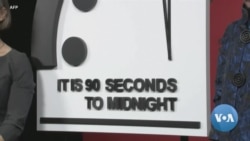The U.S. accused Russia on Tuesday of violating the nuclear arms control START treaty, contending that Moscow was refusing to allow inspection activities inside Russia.
The treaty, the last major pillar of post-Cold War nuclear arms control efforts, took effect in 2011 and was extended in 2021 for five more years. It sets a limit on the number of strategic nuclear warheads that the United States and Russia can deploy and the deployment of land- and submarine-based missiles and bombers to deliver them.
Together, the two countries still account for about 90% of the world's nuclear warheads.
Washington has been trying to preserve the treaty, but ties with Moscow are the worst they have been in decades, the result of Russia’s invasion of Ukraine nearly a year ago. The U.S. has led Western allies in supplying munitions to Ukraine to help fend off the Russian attack.
"Russia’s refusal to facilitate inspection activities prevents the United States from exercising important rights under the treaty and threatens the viability of U.S.-Russian nuclear arms control," the State Department said.
In August, Moscow suspended cooperation with inspections under the treaty. It blamed travel restrictions imposed by Washington and its allies after Russia invaded Ukraine but said it was still committed to complying with the provisions of the treaty.
The State Department said Russia had a "clear path" to comply with the treaty by permitting inspections to continue.
On Monday, Russia told the United States that the treaty could expire in 2026 without a replacement, claiming that Washington was trying to inflict "strategic defeat" on Moscow in Ukraine.
Deputy Foreign Minister Sergei Ryabkov told the RIA state news agency that it "is quite a possible scenario" there will be no nuclear arms control treaty after 2026.







